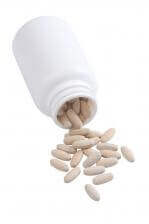Should I Take Antibiotics with Probiotics?
Does it make sense to supplement with beneficial bacteria when you’re taking antibacterial drugs or is it a waste of time and money? Nutrition Diva explains how probiotics and antibiotics work together.
Mickey writes: “Do you recommend using ‘probiotics’ when taking antibiotics? If so, when should I start?”
It’s a great question, Mickey, and one that’s plagued nutrition scientists for years, for reasons I’ll explain in a moment. Fortunately, we finally have some solid data on which to base an answer!
Most of you are familiar with the concept of probiotic foods, which include things like yogurt, kefir, and traditionally fermented vegetables. These foods all contain beneficial bacteria that set up housekeeping in your digestive tract, where they perform all kinds of useful functions, such as helping digest your food, manufacturing certain nutrients, and keeping unfriendly bacteria from moving in and making you sick.
See also: What Is Gut Microbiota?
At some point, you’ve probably also taken an antibiotic, a drug that kills infection-causing bacteria in your body. Although they aren’t much help against the common cold or flu, which are caused by viruses, antibiotics are a very effective way to treat sinus infections, pneumonia, skin infections, ulcers, and other problems caused by rogue bacteria.
While they’re taking out the bad guys, however, antiobiotic drugs can also do a number on the good guys – the beneficial bacteria in your digestive tract. That’s why people commonly experience diarrhea and other gastrointestinal issues when taking antibiotics. Which leads us to Mickey’s question: Can taking probiotics or eating probiotic foods during antibiotic therapy help prevent or alleviate these unintended side effects? Historically, this has been a controversial question.
In the past, some practitioners believed that taking probiotics at the same time as you are taking antibiotics was a waste of time and money, reasoning that the antibiotics would simply kill off the beneficial bacteria as fast as you could take them in. According to this argument, it made more sense to start taking probiotics at the end of the course of antibiotics. Others felt that eating yogurt or taking probiotics during antibiotic therapy made good sense and advised their patients to do so. But both sides were really sort of guessing.
Fortunately, we don’t have to guess anymore! Researchers have compiled data from dozens of studies, involving many different types of probiotics, and they’ve come up with a clear answer (drum roll please…)
…Taking probiotics during antibiotic therapy significantly reduces the number of side effects. But that doesn’t mean that everyone needs to take probiotics.
Nutrition Diva’s Recommendations for Probiotic Therapy
If you’re healthy: As a general rule, I don’t think healthy people need to take probiotic supplements. They’re not cheap, for one thing. And I think you can accomplish the same goal by enjoying probiotic foods on a regular basis. A word of caution: If yogurt is your preferred source of friendly bacteria, be sure to choose plain yogurt and add your own fruit. Most fruit-flavored yogurt contains a shocking amount of sugar!
When taking antibiotics: Whenever you have to take an antibiotic, it’s a good idea to ramp up your intake of cultured and fermented foods to compensate for the effects of the drug. But only about 1 in 3 people experience side effects with antibiotics so you don’t necessarily need a probiotic supplement – especially if you’re only taking antibiotics for a week or so.
When taking a lot of of antibiotics: Side effects are more common with extended or repeated courses of antibiotics. If you’re dealing with a particularly difficult infection, the last thing you need is antibiotic-associated misery. Keep eating those probiotic foods but chat with your doctor about taking a probiotic supplement as well.
If you’ve had problems in the past: People who have had trouble with with antibiotic-associated side effects such as diarrhea or yeast infections in the past may be more susceptible to these issues and might benefit from some extra probiotic insurance. Check with your doctor just to be sure.
If you’re being treated for h. pylori: Most stomach ulcers are caused by a bacteria called h. pylori, which is most effectively treated by antibiotics. With this particular bacteria, probiotics actually increase the effectiveness of the antibiotic therapy. So, if you’re being treated for h. pylori, be sure to ask your doctor about probiotics.
Note: These recommendations are not intended to replace the advice of your health professional.
Which Probiotic Should I Take?
In terms of which specific probiotic products or strains are most effective, the research reveals no clear winners. However, most studies use products that are prepared and tested specifically for research purposes. The consumer marketplace, meanwhile, is awash in probiotic products of various quality. People frequently ask me which product I recommend and I am always reluctant to choose a favorite because, frankly, I haven’t evaluated and compared every product out there. Two products that have a good track record for both quality and efficacy are Culturelle and Florastor. I’m sure there are others that are equally good – as well as some that are not as good. Unfortunately, price is not always a reliable indication of quality.
Thanks to Mickey for suggesting this week’s topic. If you have a nutrition question you’d like me to address, you can send an email to nutrition@quickanddirtytips.comcreate new email or you can post it on the Nutrition Diva Facebook page, which is where Mickey reached me. There’s always lots going on there. Also be sure to sign up for my free weekly newsletter, for more tips, recipes, and answers to your questions.
References

Susanne Hempel, PhD; Sydne J. Newberry, PhD; et al. Probiotics for the Prevention and Treatment of Antibiotic-Associated Diarrhea A Systematic Review and Meta-analysis. JAMA. 2012;307(18):1959-1969.
Image courtesy of Shutterstock.







